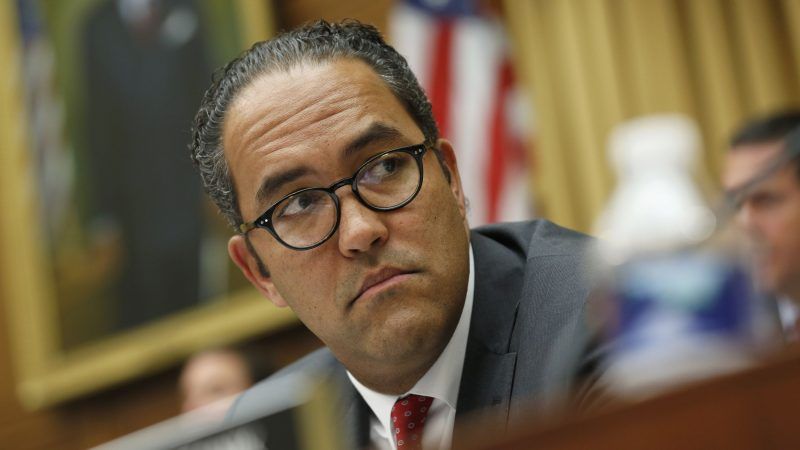The Republican Party's Retirement Problem
Trump makes life miserable for GOP lawmakers—and party leadership only makes it worse.

Last week, Texas Rep. Will Hurd, the lone African-American Republican in the House, announced that he would be retiring from Congress. Hurd's exit is part of a wave of GOP departures that signal the particular ways the Republican party is struggling under President Donald Trump—but also how its problems don't stop with the president.
Hurd, who is just 41, successfully won and held a Republican seat in the San Antonio area. It's one of the nation's most competitive districts, and it went for Hillary Clinton in 2016. From a strictly electoral perspective, Hurd's departure is a huge loss for the GOP.
I have made the decision to not seek reelection for the 23rd Congressional District of Texas in order to pursue opportunities outside the halls of Congress to solve problems at the nexus between technology and national security. https://t.co/GeZ4Hh264f
— Will Hurd (@WillHurd) August 2, 2019
After announcing his exit, Hurd criticized Trump for saying that a quartet of Democratic minority congresswomen—three of whom were born in the United States, and all of whom are citizens—should "go back and help fix the totally broken and crime infested places from which they came."
"When you imply that because someone doesn't look like you, in telling them to go back to Africa or wherever, you're implying that they're not an American and you're implying that they have less worth than you," Hurd told The Washington Post.
It is understandably hard to be a black Republican under Trump. From his birtherist conspiracy theories about President Obama to his repeated attacks on immigrants as criminals and invaders, Trump has not exactly made the GOP friendly to minorities—even before his recent racialized attacks on Democratic politicians. The party's descent into a cult of personality, willing to bend or break its principles and ideas in order to defend a president who remains intensely popular with the party's base, has made it even more difficult for those who find Trump's brand of politics distasteful or offensive to speak up in response.
But it's also just hard to be a Republican under Trump, period. Which is why Hurd is only the latest and most prominent GOP lawmaker to announce an exit from Congress. Prior to Hurd's announcement, two other Texas Republicans, Mike Conaway, who represents the Midland area, and Pete Olson, who represents a district outside Houston, also said they'd be retiring. Just yesterday, Rep. Kenny Marchant, a Republican from the Dallas area, also said he would not seek re-election. Since the beginning of the year, Republicans from Utah, Indiana, Georgia, and Alabama have thrown in the towel. More retirement announcements are expected to come.
Trump shoulders no small share of the blame for the dwindling enthusiasm of GOP representatives; behind closed doors, many freely admit they don't like him, don't like defending him, and don't like the ugly, circus-like politics he has enabled. Trump makes everything about Trump, which makes it more difficult for legislators who would like to focus on actual legislating to do the jobs they wanted to do.
But Trump isn't the only problem; GOP leadership has also played a role, even before Trump was elected, in centralizing legislative power and turning ordinary Republican lawmakers—especially in the House—into fundraising machines who are expected to show up and vote the way they're told but have little impact on actual legislation. That's at least part of how you end up with the pair of big-spending budget deals that have passed in the last two years, and also how you end up with a majority of GOP House members voting against this year's deal, in a too-little-too-late exercise in symbolic fiscal rectitude. (It certainly helped that this time Democrats held the House majority.)
As Georgetown University's Matt Glassman put it last week in an instructive Twitter thread on congressional retirements "the fun and interesting things are becoming a much smaller part of the job, while the tedious and soul-crushing aspects are increasingly occupying members' time." In earlier eras, Glassman wrote, "most members participated substantively in the policy process via the committee system. But the process is now tightly controlled by leadership, reducing opportunities for members to influence legislation."
Glassman wasn't talking only about Republican retirements, but it seems to be a particularly acute problem for the GOP. Certainly, it's a complaint I have heard frequently when talking privately to lawmakers and their staffers. And sometimes, as in the case of rabble-rousers like Rep. Thomas Massie (R–Ky.) or Justin Amash (I–Mich.), they even say it in public.
The point isn't that being a member of Congress is supposed to be fun or entertaining; sometimes serving the public is frustrating and involves hard work. But it should be productive, and the combination of Trump, who seems to go out of his way to transform every political discussion into a forum on his dubious personal merits, and the centralization of legislative power by Republican leadership, means that GOP elected officials have little to do except raise money and defend a man that many of them despise.
What is perhaps most ironic about this is that the putative goal of both strategies is to win and hold Republican seats—by sticking with a president that GOP voters like, and by micromanaging the legislative process so that no individual member has the capacity to get out of line and make headaches for the entire party. And yet the wave of retirements in toss-up districts like Hurd's has the potential to cost the GOP, especially in the House. To paraphrase Princess Leia in Star Wars, the more GOP leaders tighten their grip, the more contested seats will slip through their fingers. Republicans can't win without lawmakers like Will Hurd, but the party appears determined to do everything it can to push people like him away.


Show Comments (223)